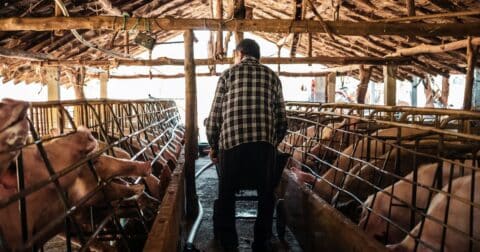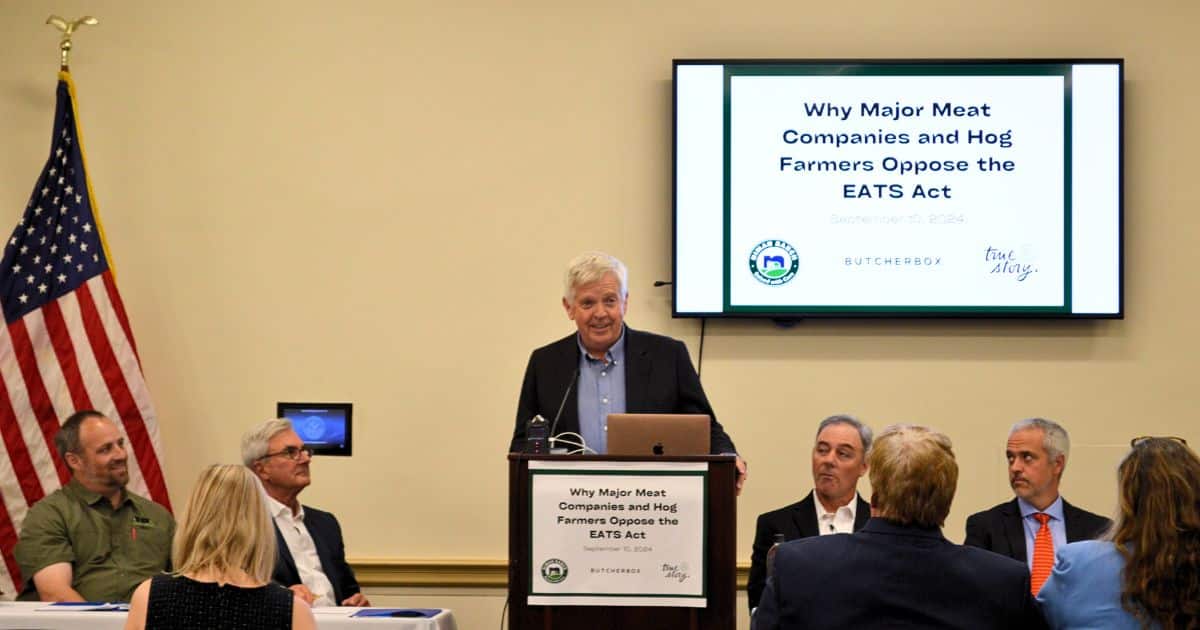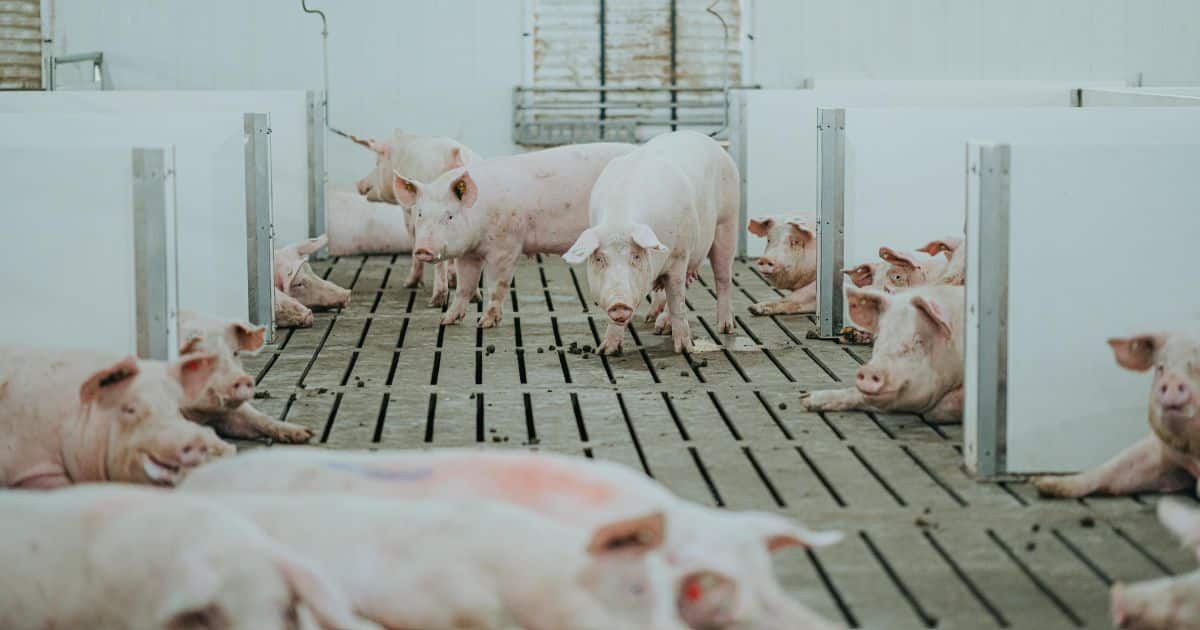Investigation
Industry Groups Worked to Expand Wisconsin Bill Meant for Small Dairies
Factory Farms•7 min read
Reported
Contrary to what ag industry groups say, these small farmers have embraced the new animal welfare law.

Reported • Meat Lobby • Policy

Words by Nina B. Elkadi
When Brent Hershey entered the hog business, he was told that every pork producer in America uses gestation crates on their farm. Gestation crates are metal enclosures, typically seven feet long and two feet wide, where a pregnant female pig, a sow, is kept during her pregnancy. The stalls are so small that sows typically cannot sit or lie down for four months — the entirety of their pregnancy while in the stall. And these gestation crates, long a fixture in industrial pork production, are at the center of a fierce debate between industry groups and the hog farmers who say they don’t want to go back to using them.
Florida was the first state to ban gestation crates in 2002. At the time, Hershey thought Floridians had no idea what they were doing — that they didn’t “understand good production.” Twenty years and a California ballot initiative later, Hershey would be tearing all the gestation crates out of his 1,000-head Pennsylvania sow farm and his 2,000 head Delaware sow operation.
The new laws got Hershey rethinking the crates. “We thought, look at the life that we are asking the animal to live,” he says. “They’re going to be safe, but they can’t walk, they can’t turn around. At the same time, we started going to see some barns that animals were free in. We looked at that and thought, wow, that really looks more natural.”
California’s Proposition 12 and Question 3 in Massachusetts are state ballot measures that banned the sale of pork born to gestation crate-sows. These laws also offer protections to egg-laying hens and veal calves. Organizations like the American Farm Bureau Federation (AFBF) and the National Pork Producers Council (NPPC) have long called for Prop 12 to be overturned, and in 2023, their case against the California Department of Food and Agriculture Secretary traveled from the Ninth Circuit to the Supreme Court of the United States. The highest court eventually upheld the constitutionality of Prop 12, but the two industry groups did not drop their opposition. Instead, they shifted focus to Congress.
The public position of the Farm Bureau and the National Pork Producers Council on gestation crates has never wavered — both groups insist pork farmers do not want the ban — yet Hershey and other farmers say differently. “As soon as the Supreme Court announced this decision, within weeks, we tore all our gestation crates out,” Hershey said at a briefing for the U.S. House of Representatives. “Now we’re on [the California] standard, and we’re doing better. It’s very ironic.”
Not long after the decision, Kansas Senator Roger Marshall introduced the “Ending Agricultural Trade Suppression (EATS) Act” to the Senate, which would prohibit “against interference by state and local governments with production of items in other states.” In effect, this bill would overturn Prop 12. And in the May 2024 version of the farm bill, House lawmakers included language similar to the EATS Act that would “ensure that producers of covered livestock are not subject to a patchwork of State laws restricting access to a national market.”
Farmers like Hershey are concerned that the language, if passed, could destroy the more humane pork market that has been created, nationwide and internationally, for farmers looking to serve the California market. California is the 5th largest economy in the world, and the state gobbles up close to 15 percent of the country’s entire pork consumption.
Yet the Farm Bureau and the Pork Council continue to deliver a national campaign that claims all pork farmers are in favor of the EATS Act, and that Prop 12 is killing their farms. “It’s not true at all,” Hershey tells Sentient. “They’re saying that they represent us all, but they do not represent us at all.”

In a statement released after the Supreme Court upheld Prop 12, Farm Bureau President Zippy Duvall wrote, “This law has the potential to devastate small family farms across the nation through unnecessary and expensive renovations, and every family will ultimately pay for the law through higher food prices.”
“I call baloney on that,” says Iowa hog farmer Ron Mardesen, who has been raising hogs in Iowa since the 1980s. Mardesen is a farmer with Niman Ranch, a network of farmers who produce meat that is hormone-free, cage-free and compliant with Prop 12.
Mardesen sees a lack of representation for independent farmers. “We’ve lost 90 percent of independent hog farmers in the last 35, 40 years. The National Pork Producers just sit and bobble their head every time everybody wants to get bigger and wants to get more consolidated.”
In a recent advertisement campaign backing the EATS Act, the Pork Producers Council highlights “Cindy,” a fictional character who runs a barbeque food truck that sources from Perkins Family Pig Farm. Cindy’s operation shutters due to rising pork prices, and the farm does too.
A note with the video reads: “This scenario could soon become a reality across America.” The video stresses that Prop 12 especially hurts smaller farmers: “A farm that would have been transferred to future generations deteriorates into ruin or is sold to a big company,” the narrator says. “Proposition 12 has burdened every link in the food supply chain, from the farmer to the business owner.”
Yet Missouri sow farmer Hank Wurtz says he has no idea where this is coming from. All of the farms he knows are converting to Prop 12. If a sow farm is closing, it is not because of Prop 12, Wurtz adds.
“I know for a fact that there are many [gestational] crate farms in this country right now that are considering shutting down,” he says. “They’re not able to be viable anymore, but that’s not caused by California. That’s caused by 20,000 sow operations going up all over the Midwest. It is the rest of the industry’s large-scale operations that are making the small family farms irrelevant.”
According to data from the U.S. Department of Agriculture, since 1990, “the number of farms with hogs has declined by more than 70 percent as individual enterprises have grown larger.” Meanwhile, the number of hogs continues to grow in the U.S., primarily in concentrated animal feeding operations that typically house anywhere from 750 to tens of thousands of hogs per building.
Rising input costs and stagnant pig prices are causing smaller, independent farmers to turn to alternative strategies to stay afloat.

When Prop 12 was passed in 2019, Wurtz saw an opportunity in a niche market. According to Wurtz’s research, sow farmers have been getting approximately the same price — around $42 — for piglets throughout the past 10 years. With Prop 12, Wurtz saw an opportunity to make his farm more economically viable.
“We love farming, but we need to be able to make money and support our families,” he says. “When Prop 12 came along and they’re offering around $50 a pig, that’s a game changer.”
Wurtz says he has invested $12 million into building a brand-new Prop 12 sow barn to replace his gestation crate operation in Northwest Missouri.
“It wouldn’t have been feasible in 2019 to go build a $12 million farm based on just the animal humane aspect of it. We wouldn’t have been able to bankroll it. It had to pay around 30 percent more because it cost 30 percent more to make it Prop 12,” he says.
When the law was challenged by the Supreme Court, Wurtz felt abandoned by the NPPC, and envisioned a future where small, family farms like his would no longer be able to exist.
“We were actually shaking in our boots at that time,” he says. “We’d be no longer financially viable.”
Wurtz did not get into the Prop 12 business for animal welfare — he’s sure to clarify that. But the increased quality of life for his sows has been an unanticipated benefit.
“We didn’t feel like we were abusing our animals all those years. But in hindsight, now looking at the farm that we have in Missouri here, I get the point,” he tells Sentient. “If you grow up a certain way, you just think crates are normal.”
Wurtz says he knows a lot of farmers who do not want to speak out in support of Prop 12 because they do not want to be associated with animal rights activists.
“But the fact of the matter is, Prop 12 is one of the best things, economically, that’s happened to us in a very long time,” he says. “That’s good for American farmers. We need to make a living somehow. If Californians want to pay more for it, we welcome that.”
The last farm bill to pass through the U.S. Congress was in December 2018. It expired in Sept. 2023, got a one-year extension, and then expired again at the end of September 2024. The EATS Act is included in the House Republicans’ version of the 2024 farm bill draft.
“[The EATS Act] was introduced with the strategy of them trying to attach it to the farm bill,” says Farm Action Fund Senior Director of Programs Christian Lovell at an EATS Act event held at George Washington Law School. “I don’t think anybody thinks that a bill like that would be considered as a standalone item.”
The EATS Act is unprecedented in that the broad language of the bill could have larger ramifications to states’ rights than just what kind of food can be sold. According to a report by the Harvard Animal Law & Policy Program, certain terms in the bill, like “agricultural products” are “defined so broadly as to potentially include vaccines, vitamins, and even narcotics.” The EATS Act could even threaten the labeling of meat, including where it comes from.
At the G.W. Law event, Lovell emphasized that consumers care about where their food comes from and how it was raised, and the EATS Act could obstruct that information.
“The corporations that control our food system, it’s almost like they want to hang a veil over that,” he says. “They don’t want the consumer to see anything until it gets to the grocery store shelves, and that’s because those corporations have rigged a food system that is extractive to rural communities like the ones I grew up in and now live in.”
For Mardesen, the fact that the EATS Act was just slipped into the farm bill makes the prospect of its passage more likely.
“I have not seen this as a hill that many people are willing to die on. The thing that scares me, and it really worries me, is that, look, if we get into this 11th hour wheeling and dealing, and you’ve got somebody who says, ‘Okay, I’ll do this. If you do this,’ I don’t know how pivotal this is [for legislators] at this point,” he says.
The saddest part for Mardesen is the impact this could have on farmers like Wurtz, who have shifted their entire operation for Prop 12.
“So many guys have already made the commitment, already made the investment, already made the transition to gestation-crate-free systems in order to reap the benefits from the higher markets, and that stool is going to be kicked right out from underneath them,” he says. “And that’s a lot of good, hard working pork producers that we need.”
That includes hog farmers like Hershey, who came to question what he once believed to be a necessary part of his work: “If, hypothetically, that model was the cheapest way to produce pork, putting pigs in cages that can’t turn around and can’t walk for four months at a time, if that’s legitimate, then you gotta ask the question, ‘yes, but is that okay?’”
Correction: An earlier version of this story had incorrectly described height and width for the measurements of gestation crates.